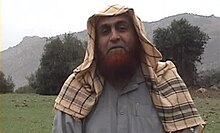Abu-Zaid al Kuwaiti
Abu-Zaid al Kuwaiti | |
|---|---|
Khalid Bin Abdul Rehman Al-Hussainan (خالد بن عبد الرحمن الحسينان) | |
 | |
| Born | 1965 or 1966 |
| Died | December 6, 2012 (aged 46) |
| Cause of death | Drone strike |
| Organization | Al-Qaeda |
| Known for | Possible heir to Ayman al-Zawahiri |
Abu-Zaid al Kuwaiti (born Khalid Bin Abdul Rehman Al-Hussainan (Arabic: خالد بن عبد الرحمن الحسينان); 1965 or 1966 – December 6, 2012[1][2][3][a]) was a high-ranking member of Al-Qaeda, and was considered a potential successor to Ayman al-Zawahiri, the head of the Salafist jihad group. Abu-Zaid was killed in a drone strike in Pakistan.
Biography[edit]
Abu-Zaid al Kuwaiti was born in Kuwait in either 1965 or 1966.[citation needed] At one point, he was an imam in the Kuwait Ministry of Awqaf and Islamic Affairs.[1] He became affiliated with the Al-Qaeda jihadist group and a member of their Islamic study committee,[1] eventually joining the top tier of leaders.[citation needed] Since the death of Abu Yahya al Libi earlier in 2012, Abu-Zaid was regarded as Al Qaeda's top religious scholar, appearing in many videos teaching Islam.[1][5]
Abu Zaid was considered a potential heir to the organization,[6] and accordingly became a high-value target for the United States and Pakistani government. He was killed in a drone attack[2][1] while eating breakfast (Suhur)[7][b] near Mir Ali in Pakistan,[2] and Al-Qaeda acknowledged his death three months later.[8] He was 46 years old when he was killed.[6] NBC News journalist and United States Department of Justice consultant Evan Kohlmann commented on his death in an interview with NBC. “That's a big gap in the leadership. He was the last senior Al-Qaida leader in the Afghanistan-Pakistan area who was, one, from the Arabian Peninsula and, two, who had serious clerical credentials. Now there is no obvious publicly recognizable candidate left to succeed Zawahiri.”
Abu Zaid has been honored as a martyr by al Qaeda,[6] Ansar al-Sharia in Tunisia, and Seifallah Ben Hassine.[9]
Notes[edit]
- ^ United Press International reports that he died on Friday, December 7, 2012,[4] but this disagrees with the other better sources cited here.
- ^ AFP reports that he was eating dinner after a day of fasting rather than breakfast before a day of fasting.[6]
References[edit]
- ^ a b c d e Roggio, Bill (7 December 2012). "Al Qaeda religious leader thought killed in US drone strike". FDD's Long War Journal. Foundation for Defense of Democracies. Retrieved 20 March 2018.
- ^ a b c "Drone 'killed al-Qaeda commander'". BBC News. 10 December 2012. Retrieved 20 March 2018.
- ^ Orosa, Rosalinda L. (10 December 2012). "Pakistan: US drone kills senior al-Qaeda leader". Philippine Star. Retrieved 20 March 2018.
- ^ "U.S. drone kills al-Qaida leader". United Press International. 7 December 2012. Retrieved 20 March 2018.
- ^ Khan, Ismail (10 December 2012). "U.S. Drone Strike Kills a Commander for Al Qaeda in Pakistan". The New York Times. Retrieved 20 March 2018.
- ^ a b c d Agence France-Presse (9 December 2012). "US air strike kills al Qaeda leader in Pakistan". Dawn. Pakistan. Retrieved 20 March 2018.
- ^ "Al-Qaida annonce la mort de l'un de ses chefs au Pakistan". Le Monde (in French). 8 December 2012. Retrieved 21 March 2018.
- ^ "Al Qaeda propaganda arm confirms death of senior religious emir". FDD's Long War Journal. 16 March 2013.
- ^ Joscelyn, Thomas (30 January 2013). "Ansar al Sharia Tunisia honors senior al Qaeda 'martyrs'". FDD's Long War Journal. Retrieved 20 March 2018.
